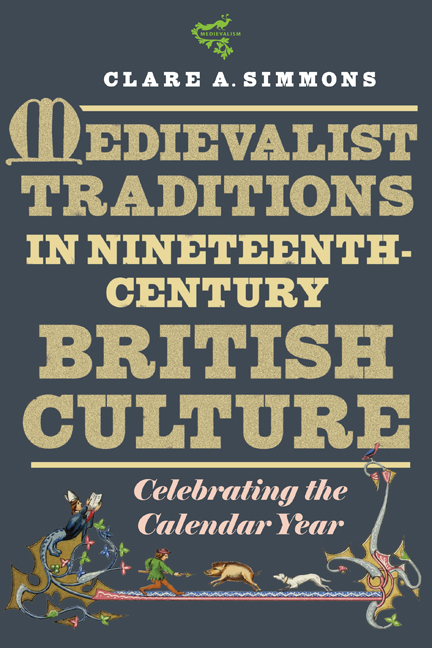Book contents
- Frontmatter
- Dedication
- Contents
- List of Illustrations
- Preface
- Acknowledgments
- List of Abbreviations
- Introduction: Medievalizing Time
- 1 The Christian and Not-So-Christian Year
- 2 Medievalist Calendar Experiments
- 3 Christmas Becomes a Season
- 4 Winter Love: St Agnes and St Valentine
- 5 Rites of Spring: Imagining Origins
- 6 Summer Festivals: Religion in Performance
- 7 Fragmented Autumn: Harvest-Home to Lord Mayor's Show
- Epilogue: Christmas Ghosts
- Bibliography
- Index
- Miscellaneous Endmatter
6 - Summer Festivals: Religion in Performance
Published online by Cambridge University Press: 09 February 2021
- Frontmatter
- Dedication
- Contents
- List of Illustrations
- Preface
- Acknowledgments
- List of Abbreviations
- Introduction: Medievalizing Time
- 1 The Christian and Not-So-Christian Year
- 2 Medievalist Calendar Experiments
- 3 Christmas Becomes a Season
- 4 Winter Love: St Agnes and St Valentine
- 5 Rites of Spring: Imagining Origins
- 6 Summer Festivals: Religion in Performance
- 7 Fragmented Autumn: Harvest-Home to Lord Mayor's Show
- Epilogue: Christmas Ghosts
- Bibliography
- Index
- Miscellaneous Endmatter
Summary
Going to Oberammergau
ON MAY 17, 1875 The Times published a notice headed “MEDIAEVALISM VULGARIZED.” In its entirety the paragraph reads:
A correspondent informs us that Oberammergau Passion Play, which has hitherto been confined to the few persons who once in ten years have been able to secure places, is now brought within the reach of the million. Schneider, who takes the principal rôle, and a number of the other actors have for the first time resolved to star the Provinces, and after performing in Bavaria and Austria, they have repaired to Breslau, where they are drawing crowded houses, and whence they will traverse northern Germany. Our correspondent very properly concludes: – “It is to be feared that the play will thus lose much of its quaintness.” (Times, May 17, 1875, 13)
The Oberammergau Passion Plays have a claimed origin not in the Middle Ages but in 1633, when the villagers are said to have vowed to perform them every ten years in thanksgiving for their preservation from the plague. The only religious play still to be permitted in the region, it underwent extensive revisions in the early nineteenth century. During a revival in interest in English mystery plays, Britons saw in the Oberammergau plays a relic of their own lost summer plays of the Middle Ages. The words “vulgarized” and “quaintness” in this paragraph suggest that the unnamed “correspondent” – probably The Times's authority on the plays Malcolm MacColl – follows the scholars of the English mystery plays in conceding that the plays were conceived and performed by ordinary people as “folk” performances, but that only the elite can truly appreciate them.
By the 1870s Britons were well informed about the Oberammergau passion plays, but this was not the case in 1841, when an article in the Christian Teacher described the writer's trek to see the plays and what he or she witnessed there. The title is pointedly medievalist: “On the Holy Plays or Mysteries of the Middle Ages, with an account of a Sacred Drama which was performed in the year 1840 at Oberammergau in Upper Bavaria.”
- Type
- Chapter
- Information
- Medievalist Traditions in Nineteenth-Century British CultureCelebrating the Calendar Year, pp. 143 - 157Publisher: Boydell & BrewerPrint publication year: 2021



